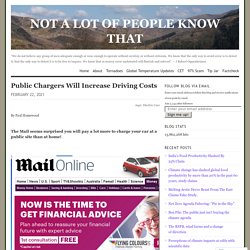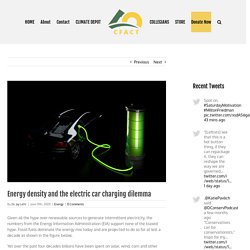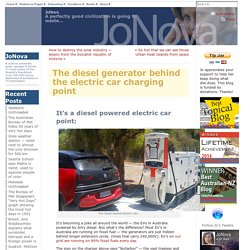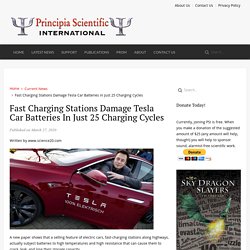

Public Chargers Will Increase Driving Costs. By Paul Homewood The Mail seems surprised you will pay a lot more to charge your car at a public site than at home!

It does not seem to have occurred to the journalist that operators need to recoup the cost of the charger as well as the electricity used. The table rather bears out my quick survey the other month, that suggested rates would be around 35p/KWh. Road Charging Moves Closer. By Paul Homewood It was of course always inevitable: As I have been saying for years, the government would have little choice but to go for road charges to replace the lost fuel tax once EVs took over.

It was always inconceivable that electricity could be taxed in the same way, as it would generate massive energy poverty and would obviously discriminate against poorer non-car households. Renault Zoe- Joke Of The Year. Electric car charging stations may be portals for power grid cyberattacks. From TechXplore by NYU Tandon School of Engineering The map displays substations connected by transmissions lines along with electric vehicle charging stations.

Britain’s First Electric Forecourt (Paid For By Taxpayers) German Drives e-Motorhome 7500 Km To The Top Of Europe And Back – But Had To Charge 95 Times! 7500-km trip by e-vehicle The online German economento.de here reports how last August German e-mobility enthusiast Frank Eusterholz drove a 136-hp modified e-camper from Hanover to the northernmost point in Europe.

Eusterholz, a tech geek, believes he is probably the first person to have made the journey to the North Cape with an electrically powered motor home. But it wasn’t all smooth going, he described. New £19 billion ‘e-highway’ network with overhead cables for electric lorries ‘could slash carbon emissions by 5% By Paul Homewood h/t AC Osborn An electric road system which could see a network of overhead charging cables along the UK’s major road network ‘would almost completely decarbonise UK road freight’, a report has found.

The plan, which would cost an estimated £19.3billion, would see National Grid powered catenary cables charge 65 per cent of the nation’s lorries using an extendable rig known as a pantograph- similar to those used on an electric train. Energy density and the electric car charging dilemma. Given all the hype over renewable sources to generate intermittent electricity, the numbers from the Energy Information Administration (EIA) support none of the biased hype.

Fossil fuels dominate the energy mix today and are projected to do so for at lest a decade as shown in the figure below. Yet over the past four decades billions have been spent on solar, wind, corn and other biofuels, not to mention electric cars which I will cover shortly. The result of all this investment been only a modest gain in market share. Part of this is the amazing number of other lifestyle products derived from petroleum. EIA has calculated that they number over 6000. While conspiracy theorists may prefer to believe that big oil, coal and nuclear have stifled the growth of renewables, it is not so. Let’s turn our attention to the most over looked source of energy coming to the fore daily, that which powers so-called electric cars. D green as their marketing insists. The diesel generator behind the electric car charging point. It’s a diesel powered electric car point: The fossil fueled electric car… It’s becoming a joke all around the world — the EVs in Australia powered by dirty diesel.

Fast Charging Stations Damage Tesla Car Batteries in Just 25 Charging Cycles. Published on March 27, 2020 Written by www.science20.com A new paper shows that a selling feature of electric cars, fast-charging stations along highways, actually subject batteries to high temperatures and high resistance that can cause them to crack, leak, and lose their storage capacity.

What is needed is a method for charging at lower temperatures and therefore less risk of catastrophic damage and loss of storage capacity. A recent experiment did just that. Scientists charged one set of discharged Panasonic NCR 18650B cylindrical lithium-ion batteries, found in Tesla cars, using the same industry fast-charging method as fast chargers found along freeways. Chaos In California, As Teslas Queue Up To Recharge on Black Friday.
By Paul Homewood h/t AC Osborn.

The practical issues of installing EV charging points. A reader posted this in the comments to the previous post.

It's by an electrician in Melbourne, and describes some work he had done on the feasibility of installing EV charging points in a local apartment building. I was amused. I recently did some work for the body corporate at Dock 5 Apartment Building in Docklands to see if we could install a number of electric charging points for owners to charge their electric vehicles. We discovered: Our building had no non-allocated parking spaces (i.e. public ones). From whence comes the power to drive electric vehicles? Elon Musk recognized early on there was money to be made in businesses that support environmental causes.
He has gained the support of the green movement by broadcasting his vision for a future without fossil fuels, reducing global warming and traveling on battery powered cars. Electrification for the UK - A Disaster in Waiting. Published on January 28, 2019 Written by Terri Jackson BSc (hons physics) MSc MPhil(econ) MInstP In a bold Big Green move, the UK government is requiring full electrification of ALL road vehicles by 2040. Motoring organisations including the AA have expressed warnings and strong skepticism that to follow through on this plan would place too much strain on the National Grid. The National Grid estimates that most electric cars will require a battery capacity of 90 kilowatt hours(kWh) to make journeys of around 300 miles.
The present TESLA battery capacity is rated at 70KWh. Philip Foster cites as a base calculation Drax power station which uses about 0.31 kilograms of coal per KWh generated (www.euronuclear.org/info/encyclopedia/f/fuelcomparison.htm). Fast charging is only 50% efficient so a single charge will require 140KWh of electricity for a single charge, giving about 43 kilograms of coal for one charge(0.31×140). Watch it on youtube!
(see also www.notrickszone.com) Many think they should.